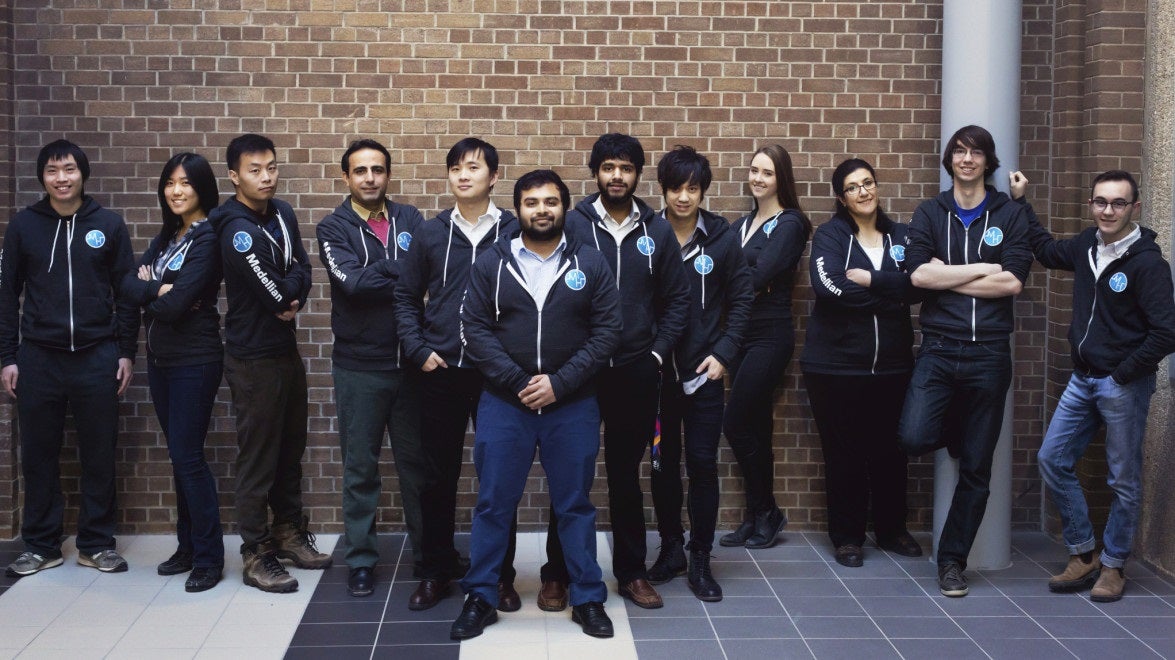
Medella members, winners of a national startup award, pose for a team picture.
A student startup with strong ties to Waterloo Engineering has taken first prize in Canada in the annual James Dyson Award competition for its work on smart contact lenses to monitor glucose levels for people with diabetes.
Medella Health, which was co-founded in 2013 by Waterloo nanotechnology engineering graduate Huayi Gao and operates out of the University’s Velocity Garage in downtown Kitchener, is joined in the top five by two other Waterloo Engineering startups.
Arylla Inc. is developing ink technology to tackle fraud in the food industry, while fellow runner-up Penta Medical, which was inspired by a broken foot, is working on fabrics and wearable devices that use infrared therapy to speed recovery from injuries.
It is the third year in a row that Waterloo companies have figured prominently in the prestigious contest, which was started by the British inventor of the bagless Dyson vacuum cleaner. Two startups made the top five in Canada in each of 2014 and 2015.
Contest success continues
Last year, Voltera and its four Waterloo Engineering co-founders – Alroy Almeida, Katarina Ilic, James Pickard and Jesus Zozaya – went on to become the first Canadian entry to win the international James Dyson Award, besting 710 entries from 20 countries.
Voltera claimed a $60,000 top prize, plus $10,000 for the University, for its custom circuit board printer, which enables rapid prototyping and dramatically reduces delays by using conductible inks.
This year’s contenders with Waterloo Engineering connections will now move on to the same international competition, which features 110 finalists from 22 countries. The field is scheduled to be whittled down to a shortlist of 20 later this month, with the winner announced in late October.
The other founders of Medella are Waterloo science graduates Harry Gandhi and Maarij Baig. It now has a team of 15 experts in nanotechnology, health IT, micro-electronics and micro-fabrication, and announced this summer that it had raised $1.4 million in seed funding.
The company hopes to begin clinical testing next year of contact lenses that continuously monitor glucose levels in the tears of wearers and send information, including warnings, to their smartphones, enabling better management of their diabetes.
No need to draw blood
“Users will no longer have to draw blood to perform a measurement and the continuous nature of the device means that many more readings can be performed on a routine basis,” the Medella team wrote in its submission for the $4,000 national Dyson award.
Arylla was founded by Waterloo nanotechnology graduates Perry Everett, Graham Thomas and Benjamin Rasera to help reduce food fraud, which they described in their submission as an “enormous global problem.”
Based at the Velocity Science lab on campus, it is developing systems using nano inks on packaging that react to scanners or the camera flashes on customer smartphones to determine if food products, as well as goods such as electronics and pharmaceuticals, are legitimate or counterfeit.
“Not only do counterfeit foods pose a risk to the consumer, they also support large international crime organizations and result in huge losses for legitimate producers,” the company wrote in its Dyson entry.
Also based at Velocity Science, Penta Medical was founded by Daniel Choi, a Waterloo mechatronics engineering student, and biomedical sciences student Alexa Roeper. Dan Venis, a mechatronics engineering student, was also listed as a member of the Dyson runner-up team.
Penta takes 'patient-centric' approach
Penta is developing photoactive fabric to reflect back infrared radiation naturally produced by the human body, as well as wearable pods with LED emitters to target injuries, reduce pain and speed healing.
“Our technology is all about being patient-centric,” members wrote in their Dyson submission.
Open to university students and recent graduates, the James Dyson Award program encourages and rewards innovative products or concepts that do a better job of solving tangible problems.